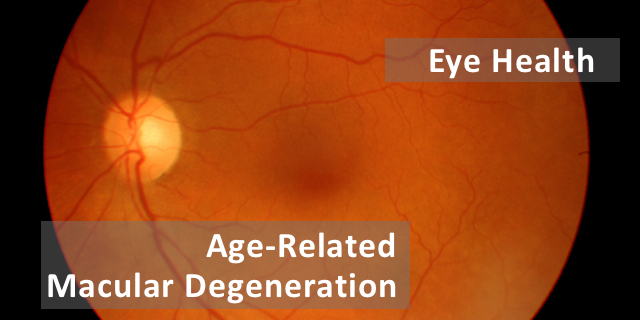What is the Macula?
The retina is the back of the eye, the part of the eye which turns light into electrical signals that travel through the optic nerve to the brain. The macula is a place on the retina which provides sharpness and visual acuity. It is the most sensitive part of the retina.
As many as 10 million people in the US have been affected by macular degeneration. When it is damaged, the center of vision becomes dark or blurry.

As age increases so does the risk of macular degeneration. Other risk factors include smoking, genetics or family history and race (more common among Caucasians). There are three stages of the disease, early, intermediate and late. In its early stages, there are few symptoms. Regular eye exams are important to catching age related macular degeneration in its early stage.
Here is an infographic from the National Eye Institute.
Eye Care
The New England Eye Center at Tufts Medical Center have created a list of healthy eye care habits.
1) Do not smoke. Read more about how smoking and quitting smoking affects macular degeneration and eye health.
2) Eat healthy foods with a diet rich in green, leafy vegetables such as kale, spinach, and collard greens. Eat fruit.
3) Eat fish high in omega-3 fatty acids at least once or twice a week. This includes salmon, sardines, mackerel, herring, and albacore tuna.
4) Avoid processed snack foods such as cakes, cookies, potato chips, candy, and soft drinks. Read more about why junk food is bad for eye health.
5) Avoid partially hydrogenated fats such as coconut or palm oils. Use oil from olives, canola, or flaxseed in moderation.
6) Maintain normal blood pressure, blood sugar, and cholesterol levels
7) Maintain a healthy weight.
8) Exercise. Walk half an hour every day, or participate in more strenuous activities if possible, like yoga, aerobic activities, or sports.
9) Wear sunglasses and a hat with a visor in bright sunlight to protect your eyes from potentially harmful ultra-violet (UV) light and blue light.
10) If you have symptoms of macular degeneration or a family history of AMD and an unhealthy diet, take supplements which include lutein, zeaxanthin, vitamin C, vitamin D, vitamin E, zinc, and omega-3 fatty acids (fish oil).







This is mostly generic info THOUGHT to live a long, healthy life, but there is little written here that is actually PROVEN to slow/stop/prevent AMD. The only one item that comes close is the suggestion to take a complex vitamin (e.g. AREDS) based on ONE NIH study. And, after one read of the study, I suspect that too is too weak to be reliable. Yes, one or more of the constituents of the vitamin mixture helped, but which one????